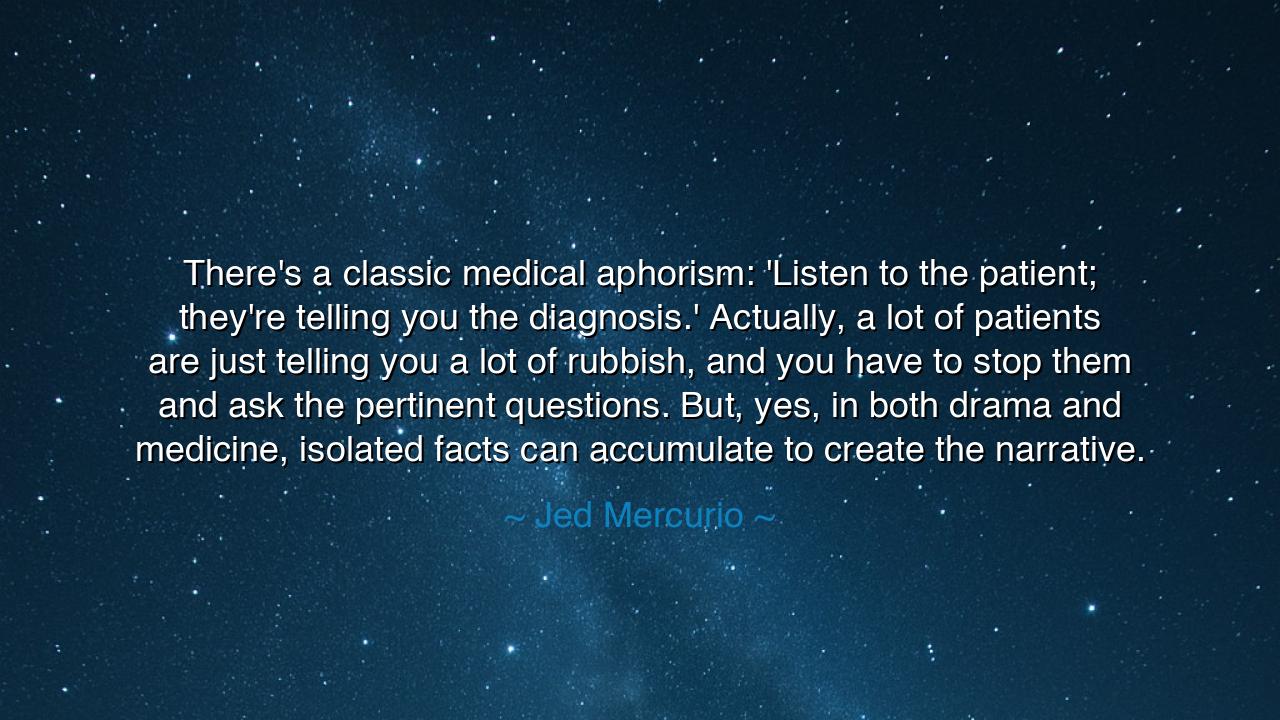
There's a classic medical aphorism: 'Listen to the patient;
There's a classic medical aphorism: 'Listen to the patient; they're telling you the diagnosis.' Actually, a lot of patients are just telling you a lot of rubbish, and you have to stop them and ask the pertinent questions. But, yes, in both drama and medicine, isolated facts can accumulate to create the narrative.






The words of Jed Mercurio—“There’s a classic medical aphorism: ‘Listen to the patient; they’re telling you the diagnosis.’ Actually, a lot of patients are just telling you a lot of rubbish, and you have to stop them and ask the pertinent questions. But, yes, in both drama and medicine, isolated facts can accumulate to create the narrative.”—speak with both irony and insight. Beneath their wit lies a profound truth about discernment, the art of separating signal from noise, wisdom from confusion. Mercurio, himself a physician before he became a storyteller, reminds us that both the doctor and the dramatist must listen deeply—but not blindly. Truth often hides within chaos, and only the discerning mind can piece together the fragments to form the story that matters.
The origin of this quote lies in Mercurio’s years of practice in medicine, where he learned that listening is both an act of compassion and of discipline. The ancient aphorism he references—“Listen to the patient; they are telling you the diagnosis”—has guided generations of healers. It speaks to the idea that within the patient’s words lies the key to their suffering, if only the physician listens with care and humility. Yet Mercurio, ever the realist, adds a modern reflection: not all words carry meaning, and not every story leads to truth. The good doctor, like the wise philosopher, must question, filter, and interpret. For in the flood of human expression, one must learn to hear not the loudest sound, but the quiet truth beneath it.
This balance between listening and questioning is as ancient as the practice of wisdom itself. In the dialogues of Socrates, we see this same principle at work. Socrates listened to the claims of others—not to accept them, but to draw out what was hidden through inquiry. The great physician Hippocrates taught similarly, instructing healers to “observe and inquire” before judging. Mercurio unites these traditions in his own way, showing that medicine and storytelling are reflections of the same craft: both begin with fragments of reality—symptoms, facts, words—and both demand the art of assembly. The healer and the writer are both seekers of patterns in chaos, constructing meaning from the scattered pieces of human experience.
The connection Mercurio draws between drama and medicine reveals the moral and artistic unity between the two. In medicine, the physician gathers symptoms—the cough, the tremor, the pain—and from them forms a diagnosis, a narrative that explains the whole. In drama, the writer gathers moments—the look, the silence, the hidden act—and weaves them into a story that reveals the soul. In both, the task is the same: to make sense of the fragments of human life, to reveal truth where before there was only noise. Yet the challenge also remains the same: not every detail is sacred, not every word is revelation. The healer must ask, and the artist must choose, lest both drown in excess.
History offers us a powerful lesson in this art of discernment. The story of Dr. Ignaz Semmelweis, a 19th-century physician, stands as a parable of listening and understanding. In the hospitals of Vienna, countless women were dying of childbed fever, and the explanations of the time were tangled in superstition and arrogance. But Semmelweis, through careful observation and the willingness to question false narratives, discovered that doctors themselves—by failing to wash their hands—were carrying death from patient to patient. He listened not only to the words of others but to the unspoken truth hidden in observation. His discovery was dismissed, yet it later saved millions. So it is with Mercurio’s teaching: wisdom lies not in listening to everything, but in hearing what matters most.
Mercurio’s reflection also holds a mirror to modern life. In an age of endless information, opinions, and noise, we are all physicians of our own understanding—surrounded by voices, many sincere yet few precise. We are told to listen, to be open, to absorb; but without discernment, listening becomes surrender. The wise man listens deeply but filters bravely. The artist listens for the rhythm beneath the words; the leader, for the truth beneath the crowd’s roar. The soul that cannot discern becomes sick with confusion. Thus, Mercurio’s teaching becomes universal: listen with empathy, but interpret with wisdom.
From Jed Mercurio’s insight, let us draw a timeless lesson: that knowledge begins in listening, but wisdom begins in questioning. The good listener is not a passive ear, but an active mind—one that organizes chaos into clarity. Whether in healing or in living, we must learn to gather the fragments of experience and shape them into understanding. Let us not be fooled by noise nor blinded by silence; let us instead seek the thread that connects all things, the story hidden beneath the surface.
So remember his words, as one remembers the counsel of the elders: in both life and art, we are surrounded by a thousand voices. Some mislead, some distract, some speak truth softly, like the murmur of a river beneath the storm. Your task is not to hear them all, but to listen rightly—to sift through the noise and find the harmony within. For only through such discernment can we, like the wise physician or the true storyteller, turn confusion into comprehension, and fragmented facts into the narrative of truth.






AAdministratorAdministrator
Welcome, honored guests. Please leave a comment, we will respond soon